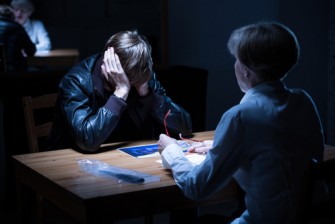Sleep deprivation increases false confessions, study suggests

Image from Shutterstock.
Students who participated in a study at Michigan State University were more likely to falsely confess to hitting a computer key that erased study data when they were sleep-deprived.
Eighty-eight students participated in the study, conducted in a sleep lab at Michigan State University, Science magazine reports. The students were given one warning as they solved problems and answered questions on computers: Don’t hit the escape key because it will erase valuable study data.
On the final day of computer sessions, the students were divided into two groups. One group stayed awake all night while playing card games or watching TV shows. The other was allowed to sleep for eight hours.
The next day, the students received a typed statement summarizing their performance. None had pressed the escape key, according to keystroke data, but the statement said they had done so. The students were then asked to sign the statement to confirm it was accurate.
Among the sleep deprived group, 22 falsely agreed they had hit the escape key. When asked a second time to sign the false statement, the total increased to 30.
Among the well-rested group, eight admitted they had hit the escape key when first asked, and the total increased to 16 when asked again.
Among the sleep deprived group, those who scored lower on a cognitive test related to intelligence were much more likely to sign the false confession.
Additional coverage of the study is in the New York Times and the New Scientist. Press releases are here, here and here.
Michigan State University psychology professor Kimberly Fenn led the study, published in the Proceedings of the National Academy of Sciences. One of the co-authors is University of California at Irvine law and psychology professor Elizabeth Loftus.



